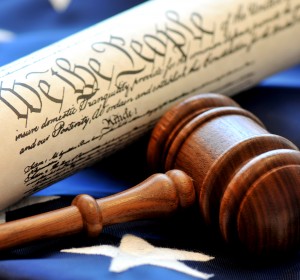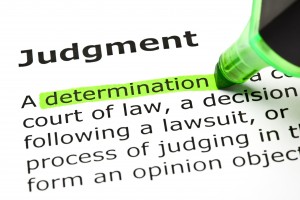By Ryan C. Wood
A sequence of events that takes place is a person lends money or credit is extended and then the borrower for whatever reason cannot continue to make payments and breaches the repayment agreement. The creditor then sues them in California Superior Court. There are numbers of ways to obtain a judgment, but a judgment is entered against the borrower in state court. Or an arbitration award is entered against the borrower. Can the judgment or arbitration award be used against the borrower if the borrower chooses to file for bankruptcy protection? Can the judgment be used to make the debt owed not discharged? This is an issue of issue preclusion. Can a judgment or arbitration award be entered against the borrower in Bankruptcy Court? Will the Bankruptcy Court require litigation of the same issue already decided by the judgment or arbitration award?
Like the answer to many legal questions bankruptcy attorneys must answer, the correct answer is it depends upon the judgment or language of the arbitration award. The Bankruptcy Appellate Panel for the Ninth Circuit recently discussed this issue in Richard Scott Urban vs. BCS West, LLC; BAP No. SC-13-1047. According to California state law California courts may apply issue preclusion only if certain requirements are met and if the application of issue preclusion furthers the public policies underlying the doctrine. The doctrine of issue preclusion is the theory that issues already decided in state court should or must be recognized by federal courts pursuant the Full Faith and Credit Clause of the United States Constitution. Under California law requires that (1) whether the issue sought to be precluded from relitigation is identical to that decided in the former proceeding; (2) whether the issue was actually litigated in the former proceeding; (3) whether the issue was necessarily decided in the former proceeding is final and on the merits; and (5) whether the party against whom preclusion is sought was the same as, or in privity with, that party to the state court proceeding. If these requirements are met California courts must further consider whether any overriding concerns about the fairness of the former proceeding are present or consistent with sound public policy.
Regarding an arbitrary award Federal Bankruptcy Courts can give California arbitration awards preclusive effect if the arbitration proceeding was held in an adjudicatory manner. Arbitration awards that have been confirmed by California courts have been given preclusive effect in Bankruptcy Court too. California judgments are more likely to be given preclusive effect given that they are more likely to satisfy the actually litigated factor listed above. Many arbitrations are not held in an adjudicatory manner.
One of the most important factors is the wording of the judgment or arbitration award and the facts that came to light in the California State Court matter. One of the main areas of Bankruptcy cases that California State Court judgment are used for issue preclusion purposes area in adversary proceedings to determine whether a debt or claim is discharged or if the debtor should receive a discharge of their debts at all. A bankruptcy attorney may not have been retained to represent the creditor or debtor in the California State Court litigation. The wording of the judgment or arbitration award will be extremely important for the Bankruptcy Court’s analysis if issue preclusion can be used. In Urban case the Bankruptcy Appellate Panel held that the arbitration award was ambiguous. In Federal Bankruptcy Court the question of whether all of the requirements for a debt to be deemed not discharged is an uphill battle and any ambiguity in the California State Court case will be decided in favor of the debtor or bankruptcy filer. What is proven in the California State Court will most likely not be exactly the same as a fraud charge, breach of fiduciary duty or willful or malicious injury. If you believe a person you are suing is going to file for bankruptcy protection in the future you must carefully craft your allegations and the wording of any judgment or arbitration award so that it can be used in bankruptcy court.

